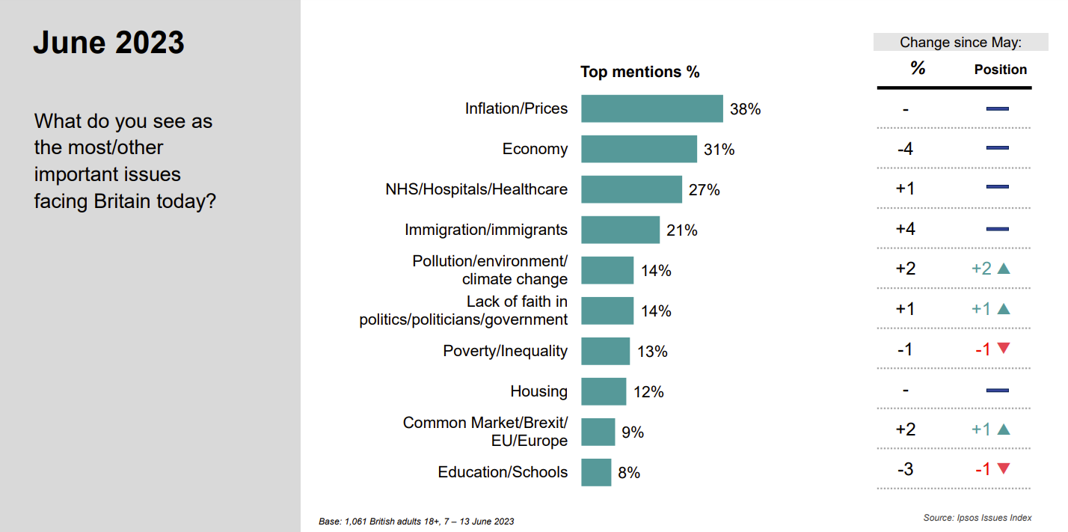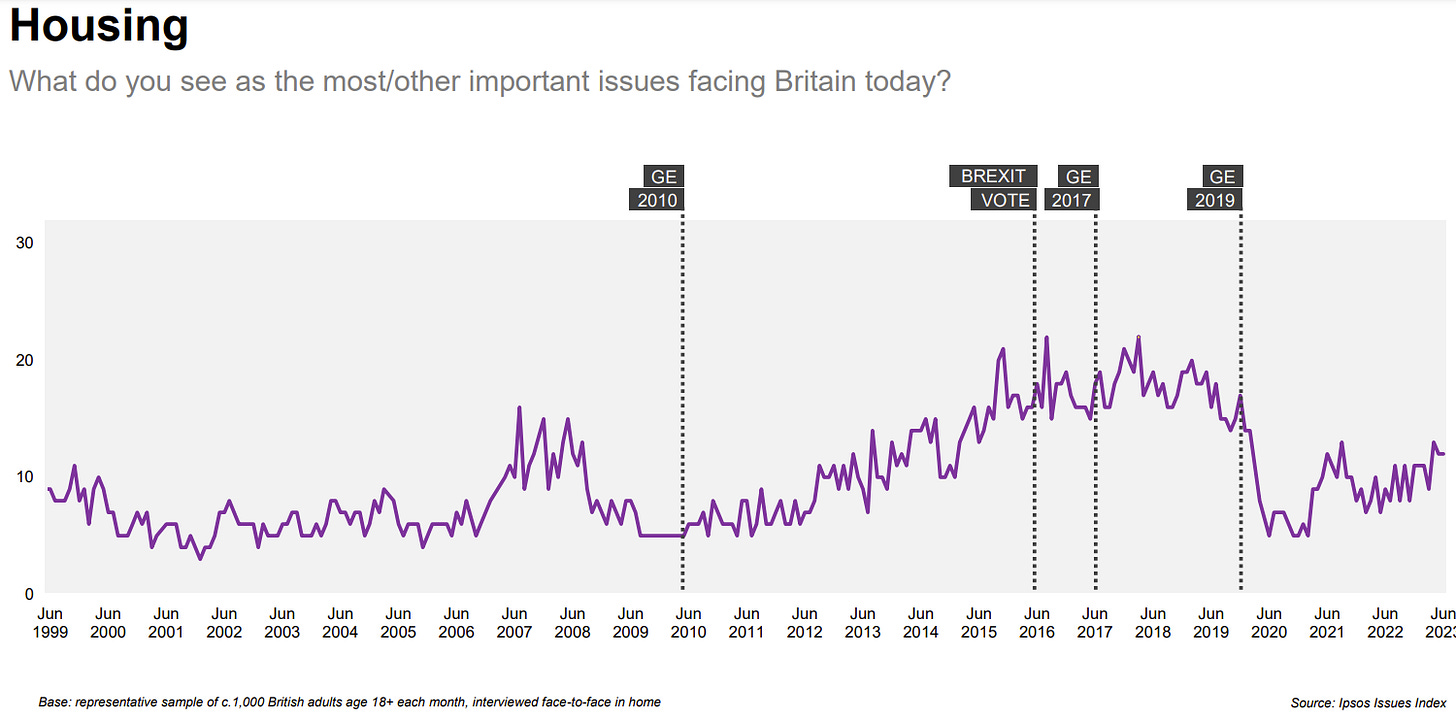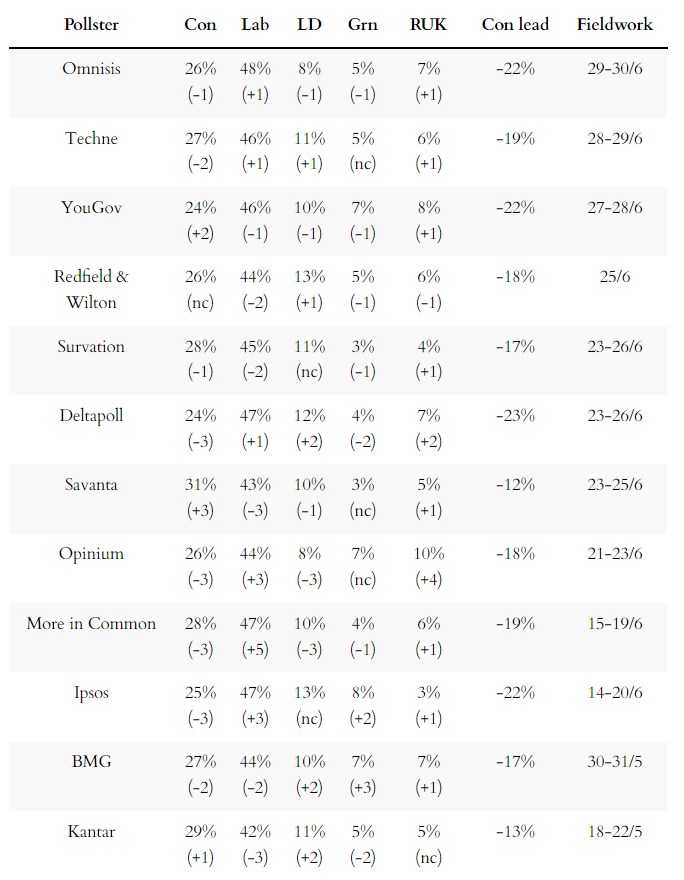Welcome to this week’s edition which takes a look at how pollsters ask about the top issues, and what results they get.
But first, this week’s weary sigh of resignation is directed at the Daily Express for claiming that the Conservatives were five points behind when Boris Johnson resigned as Prime Minister - which was true in one poll, but the other polls, unmentioned by the paper, with fieldwork at the same time as that poll had the Conservatives down by 11, 12, 12, 14 and 15 points. A bonus sigh for the Express journalist who, in rebuffing criticism of his paper’s own piece, rather puzzling himself attacked picking out just the one poll, when his own paper had done precisely that.
As ever, if you have any feedback or questions prompted by what follows, or spotted some other recent polling you’d like to see covered, just hit reply. I personally read every response.
Been forwarded this email by someone else? Sign up to get your own copy here.
If you’d like more news about the Lib Dems specifically, sign up for my monthly Liberal Democrat Newswire.
My privacy policy and related legal information is available here. Links to purchase books online are usually affiliate links which pay a commission for each sale. Please note that if you are subscribed to other email lists of mine, unsubscribing from this list will not automatically remove you from the other lists. If you wish to be removed from all lists, simply hit reply and let me know.
What issues matter most to voters?
Most of the time, question wording matters. Tweak the wording and you get different answers. Asking people what issues are most important is, however, different. Across different pollsters, quite a range of different question wording and answer options is used, but the results are - with two exceptions I’ll come to - reassuringly similar.
The reason is that asking people what matters most is asking them about what’s already on their mind and they’ve given thought to. That means the question wording is much less influential than if you’re asking about something people have barely thought about until the pollster mentioned it.
The similarities of answers also apply whether people are asked an open-ended question (to which they can say anything in reply and the pollster then groups the answers under different headings) or a closed-question (where the person is giving a list of pre-written options to pick from).
Handily, the pollster with the longest-running data set, Ipsos (previously MORI), uses an open-ended question. That also makes its data robust when comparing trends over the decades as changes in the words people use to answer issues questions are catered for.
But there are those two exceptions to the consistency of answers across different questions. One is the simple difference between whether people are asked to pick the top issue or the top three issues (the two different approaches most commonly used).
The other is the difference between whether people are asked about the most important issue for them and their family or the most important issue for the country.
Let’s see the impact of that with Deltapoll’s recent issue polling:
As is typical across issue polling at the moment, the NHS and cost-of-living/economy concerns dominate the list. There’s then a middle tier of issues such as immigration, the environment and housing, with Europe/Brexit sometimes popping into the middle tier and more usually being lower than that, instead in the bottom tier of issues that only score single digit responses.
Immigration is the most prominent issue which also consistently shows a noticeable difference between whether people are asked about what’s most important for the country or for them. It scores higher on the former and lower on the latter, reinforcing the pattern that is often seen of concerns about immigration being higher where its levels are lowest, i.e. this being about a more generalised concern rather than about a direct reaction to personal experience.
To show the point about similarity of results, here’s the latest Ipsos data with its open-ended question to compare with that Deltapoll data:
Note again the dominance of the NHS and cost-of-living/economy, and again how low both housing and Brexit come, along with education.
That’s now quite a well-entrenched pattern, with the recent rise in housing as an issue still leaving it below previous levels:
The rule of thumb I was taught, and which seems to hold up, is that it’s the issue choices for yourself and your family rather than for the country that are most influential in how people vote. Which makes the lower appearance of immigration on that score, and the very, very low scores for (other) culture war type issues, an unpromising backdrop against which to argue that this is the route to Conservative electoral success. (See also the polling on small boats in the 10-points round up below.)
Prices and ambulances rather than small boats and toilet policies are looking the election-winning approach.
Know other people interested in political polling?
National voting intention polls
That increase in Labour’s lead mentioned last time looks to have been sustained, and we’re now had a run of 20 polls in which only one put Labour’s lead at under 15 points, and even that was still 12 points.
Here are the latest figures from each currently active pollster:
For more details and updates through the week, see my daily updated table here and for all the historic figures, see PollBase.
Last week’s edition
Who is right about the combined Labour and Conservative share in polls?
The difficult politics for the government of mortgage help, and other polling news
These weekly round-ups are for paying subscribers only, but you can sign up for a free trial to read them straight away.
Keep reading with a 7-day free trial
Subscribe to The Week in Polls to keep reading this post and get 7 days of free access to the full post archives.








